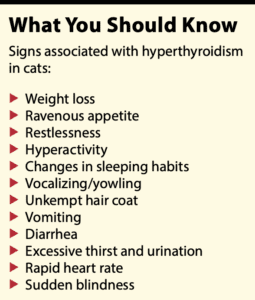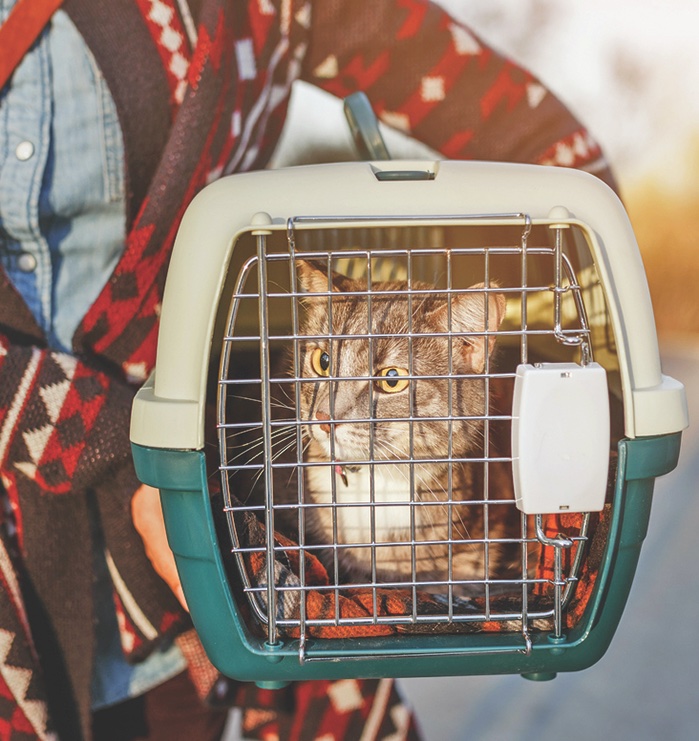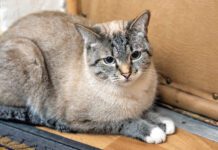Your cat deserves to be treated at a veterinary clinic that goes the extra mile to minimize stress and makes her feel comfortable and relaxed. One way some clinics do this is by becoming certified as “Fear Free.” While the certification is not a necessity, it’s a step in the right direction, says Dr. Katherine Houpt, professor emeritus of behavioral medicine at Cornell University’s College of Veterinary Medicine.
“Fear Free” is an initiative founded by Dr. Marty Becker, whose mission is to “prevent and alleviate fear, anxiety, and stress in pets by inspiring and educating the people who care for them.” If you find a Fear Free certified veterinary clinic, your pet should feel as comfortable as possible during her veterinary visits.
But, “Just because a practice is not officially Fear Free certified doesn’t mean veterinarians are not ‘free’ to make their practices as cat friendly as they like,” says Dr. Houpt.
Cats Only Rooms
 Dogs, unless a cat knows them and lives with them, are understandably naturally intimidating and scary to cats. Having “Cats Only” waiting and exam rooms that harbor no residual dog smells helps eliminate this stress. These exam rooms should have places for your cat to hide or elevate, as hiding or getting up high is what cats naturally do when they feel threatened or stressed. Having these places available offers your stressed-out kitty a little relief.
Dogs, unless a cat knows them and lives with them, are understandably naturally intimidating and scary to cats. Having “Cats Only” waiting and exam rooms that harbor no residual dog smells helps eliminate this stress. These exam rooms should have places for your cat to hide or elevate, as hiding or getting up high is what cats naturally do when they feel threatened or stressed. Having these places available offers your stressed-out kitty a little relief.
Feliway Sprayed Towels
The Feliway calming spray contains a chemical copy of cats’ feel-good pheromones that are stored in their cheek glands. This is why cats love having you rub their cheeks or love rubbing their cheeks on things. It releases these natural calming pheromones and makes your cat feel relaxed and happy.
“Cats Only” exam rooms with continual release of Feliway from diffusers will be full of these calming pheromones, helping your cat relax upon entry. Any towel used for restraint should be sprayed with Feliway by clinic staff and kept in a sealed bin so it’s ready for use when needed.
Gentle Hands
Handling by staff should be gentle and slow. No scruffing! No sudden movements or grabbing at a limb or an ear without warning. Touch should be started slowly and softly, working toward the area being examined without removing your hands along the way. Maintaining touch, as opposed to touching intermittently, works best.
Treats
Sometimes yummy treats offered by hand or placed on the table can help. Eating is a great distraction, a behavior not limited to stressed-out humans. Toys can sometimes be useful as well, especially for younger cats.
Caution with Carriers
If the veterinary assistant offers to carry your cat in its carrier to the exam room from the reception area, they should cradle the carrier in their arms, not swing it from the handle bumping back and forth against their legs. Once in the exam room, it is best practice to remove the top of the carrier to avoid having to drag the cat out the carrier door. Part of the exam may be done with the cat in his open carrier, where he feels secure.
No Back Room
Whenever possible, work should be done in the exam room with you present. Some things cannot be done in the exam room (X-ray, ultrasound, anesthesia, surgery, etc.), but routine procedures like examination, vaccination, and nail trims usually can. It’s definitely better than the scary back room that frequently has dogs, noise, and multiple teams working simultaneously.
Bottom Line
You can help, too. Prepare your cat for the carrier. Spray your carrier with Feliway, and keep it out in plain sight for a few days before a visit. Leave the door open, and put toys and treats in there so your cat can freely go in and out and get rewarded. When heading to the clinic, cover your carrier with a towel to give your cat that added sense of peace and security inside.
If your cat is still stressed, ask about a sedative you could give in food an hour and a half before your visit. Gabapentin is frequently prescribed for this use and seems to be an effective, safe “chill pill” for many freaked out felines. A “Zen” kitty has a much better overall veterinary experience and usually gets a better, more thorough examination.




